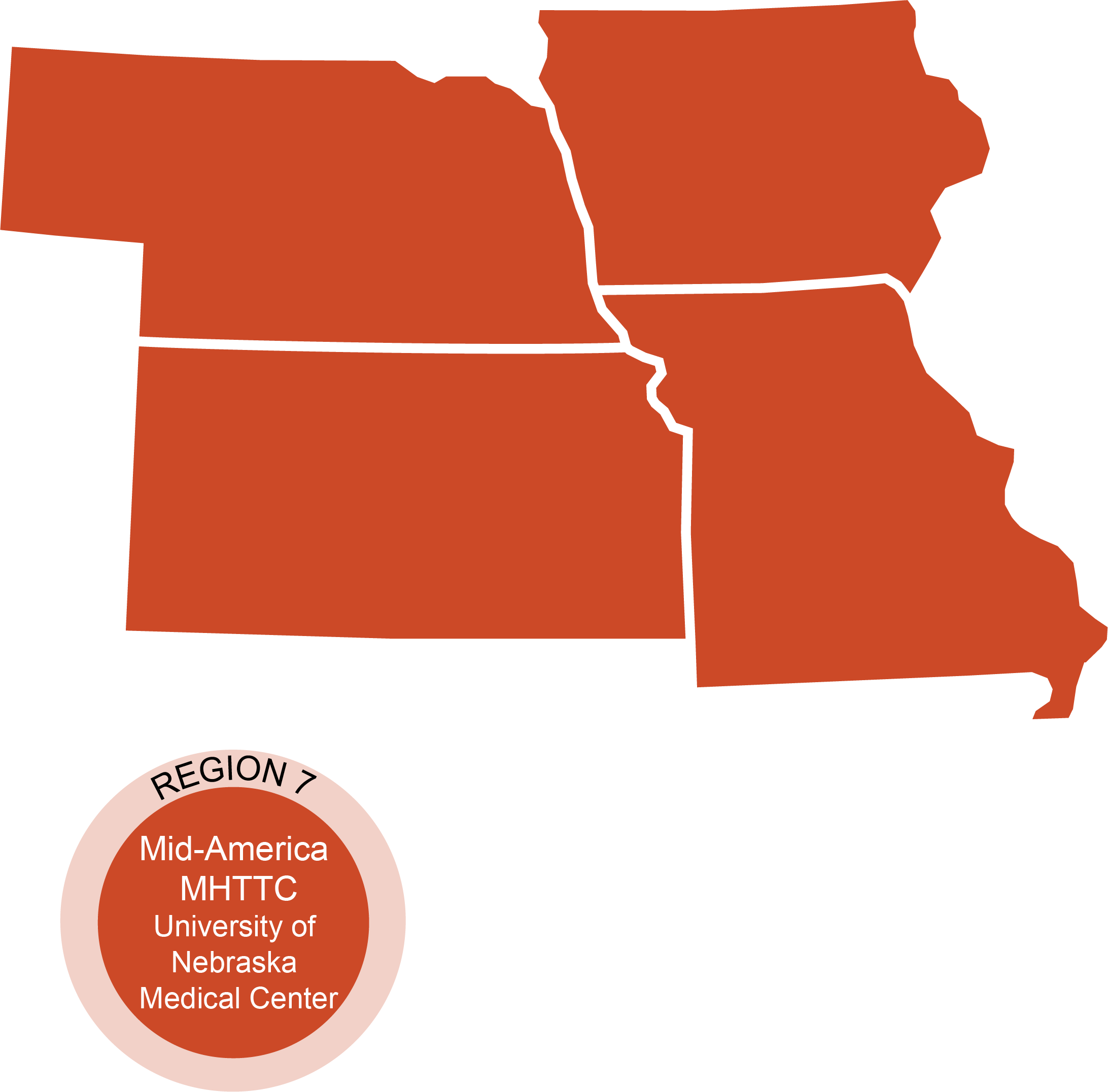Home > MIC Stories: Technical Assistance and Training in Innovative Business Models and Practice in Pediatric Primary Care in Rural Nebraska

MIC Stories (MHTTCs Implementing Change) feature technical assistance projects that had a significant impact on practice.
A licensed independent mental health practitioner (LIMHP), providing behavioral health care in a rural primary care clinic in Saline County, Nebraska, reached out to the Mid-America ATTC to set the ball rolling on this project. Ten years ago, this LIMHP completed training in pediatric integrated care through the University of Nebraska Medical Center (UNMC). About 5 years ago, she established an independent practice and contracted with a hospital organization to provide behavioral health services in their primary care clinic. This provider and the hospital organization initiated discussions to enhance their knowledge on pediatric integrated care and explore a new integrated care business partnership. The hospital organization wanted to pursue a new type of business partnership in which the LIMHPs would be better integrated into their system in terms of workflow, referral, communication, and business operations. They recognized both the value of this LIMHP’s behavioral health practice as well as her interest in providing behavioral health care in a rural, underserved area. Saline County is designated as a geographic Mental Health Professional Shortage Area (HPSA) by the Health Resources & Services Administration.
The project provided training and technical assistance in enhancing integrated care partnerships and exploring business models for integrated care between a behavioral health organization and a primary care clinic/hospital organization. Additionally, the Mid-America MHTTC provided technical assistance on increasing integration between behavioral health and medical staff to benefit patient experience and outcomes.
The Mid-America ATTC partnered with the primary care clinic/hospital organization (Crete Area Medical Center), the behavioral health organization (Quality Life Counseling), and the UNMC Psychology Department at the Munroe-Meyer Institute (MMI), which established the integrated care clinic at this site in 2005.
Partners and roles:

Monthly, from May 2020 to April 2021, the Mid-America MHTTC provided the behavioral health organization and the hospital/clinic organization with training and technical assistance in business models in integrated care and with information about implementing an enhanced model of integrated care for patients in the primary care clinic. Technical assistance occurred in a variety of formats, including didactic presentations, phone and face-to-face consultation, and written feedback and suggestions for contractual agreements and workflow development. Additionally, Mid-America MHTTC provided assistance with improving the referral system and sharing medical and behavioral health records, increasing efficiency and patient access to scheduling with behavioral health, developing models of payment and billing for behavioral health services, providing examples of contractual agreements between behavioral health and primary care agencies, and consulting on details of the agreement between the two agencies.
Challenges in this project included coordinating with staff from both organizations to ensure that behavioral health integration goals were well-communicated. Another obstacle was creating and maintaining the belief that the change in workflow and contractual agreement would actually enhance integrated care in this primary care clinic. Both agencies spent a considerable amount of time planning and executing the agreement.
The main evaluation indicator was the mutual agreement between the two agencies on the business model and process of integrated care in this primary care clinic. Both agencies were collaboratively involved in multiple iterations of the integrated care model and signed the final contract. This partnership was written into a 6-month contract that will be re-evaluated in terms of financial agreement, workflow, patient volume, and satisfaction of both agencies on the integrated care model.
Key outcomes included increased knowledge in the primary care behavioral health model of integrated care by both organizations, understanding of the revenue achieved in behavioral health primary care for a clinic this size in this geographic location, increased efficiency in job responsibilities for all involved in referrals from primary care to behavioral health, and the mutual agreement that improved communication can occur with a shared patient medical record. The time and change involved across both organizations resulted in considerable improvements in integration and increasing patient access at many levels, including behavioral health referral, workflow, billing, and efficiencies in a successful integrated care partnership.
Our team at the Mid-America MHTTC learned that models of integration continue to evolve—there are multiple business models for partnership between behavioral health and primary care clinics/organizations. We learned the importance of providing different modes of training and assistance to meet the goals of those who are establishing, enhancing, or changing the model of integrated care. We learned that flexibility in training and technical assistance is important and may involve organizational assessment, didactic training, and consultation at different stages. Finally, it was clear that models of integrated care are flexible and need to accommodate the organizations/clinics and partners involved.
The Mid-America MHTTC team will remain in communication with both organizations for additional training and technical assistance in integrated care partnerships.
Through the establishment of this integrated care practice, access to evidence-based integrated services in a mental health professional shortage area increased. Furthermore, this project has stoked our Center’s determination to develop and improve current training materials in integrated care at both the agency- and practitioner-levels. Our team is enthusiastic about developing organizational assessments, informational research briefs, and a variety of integrated care resources specific to pediatric integrated primary care practice and partnerships.

The Mid-America MHTTC serves the four states of Iowa, Kansas, Missouri and Nebraska with a focus on integrated care, schools and mental health training programs.
The Mid-America MHTTC, funded at $5.2 million by the Substance Abuse and Mental Health Services Administration (SAMHSA), was established in 2018 and is housed at the Munroe-Meyer Institute at the University of Nebraska Medical Center. The Center primarily works to integrate behavioral health care into primary care programs, but also provides training and technical assistance in implementing comprehensive school mental health programming, community-based programming to address serious mental illness, and behavioral health workforce development.
Across the region, the Mid-America MHTTC serves to align mental health systems and professional competencies with evidence-based mental health practices by providing free or low-cost training and technical assistance on a variety of topics germane to effective mental health practice. Types of training and technical assistance may include needs assessments, webinars, workshops, program evaluation and others.